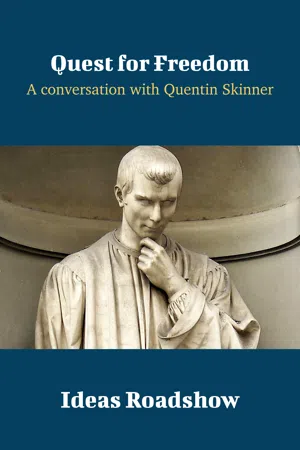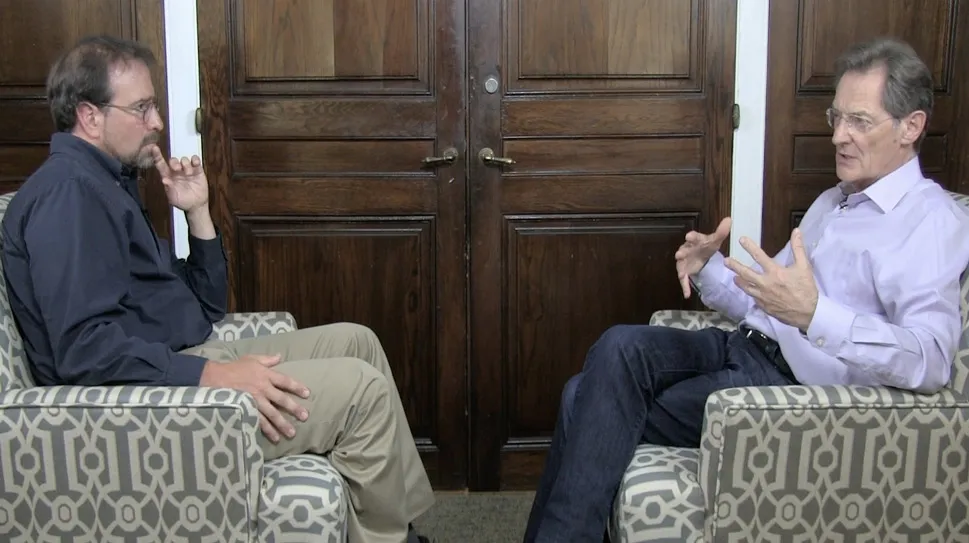![]()
The Conversation
![]()
I. Paradoxical Origins
Puzzled by Machiavelli
HB: Let me begin by asking you a personal question about liberty and your interest in political liberty. How did that begin for you?
QS: It began with historical work that I was doing when I was writing my first book, The Foundations of Modern Political Thought. I was working on questions about Renaissance moral and political philosophy and came upon some ideas that, quite frankly, puzzled me, because I was assuming that there would be great continuity in thinking about questions of freedom and citizenship, but there wasn’t. I was coming upon a view that suggested that you could not be a free citizen unless you were a politically engaged citizen.
Something was being strongly affirmed, especially in a writer like Machiavelli in the Discourses on Livy, which seemed the opposite of what our intuitions would be, which is that freedom should be thought of mainly in terms of rights. And fundamental rights include rights to be left alone, so far as is compatible with a good legal order, and getting along with one’s life in the way that one chooses. The notion that freedom would involve action—which would not be strongly chosen action, but would be almost obligatory—was a paradox that I came upon and couldn’t, at that time, properly resolve.
HB: When you first saw this, did it make you immediately think of the ideology of Roman times? Did you think of Cicero and his sense that it’s the duty of any high-born, or at least sufficiently capable, free citizen of Rome to be participating in the welfare of his state? Did that come to your mind immediately, or did it take a little bit longer? Or did it not come that way at all?
QS: It should have come that way, and I certainly looked to antiquity because the people in the Renaissance were all looking to antiquity, but I looked in the wrong place. What I thought I was bound to be driven back to was an Aristotelian understanding of citizenship, in which, to paraphrase very strongly, Aristotle wants us to suppose that human nature has an essence. I suppose we don’t completely disagree with that: we talk about actions as inhuman and so forth. But this human essence, for Aristotle, was political. As he says in the famous phrase, “Man is the political animal.”
I thought that what I was reading was a revival of this idea that there is a kind of essence to human nature, that the essence is political, and then the strong claim—which is almost on the edge of sense—that what it is to be a free person, especially what it is to be a citizen, is to realize those capacities, to realize those particular powers, because those are your distinctively human powers.
HB: To maximize the potentiality of what it means to be human, according to this definition.
QS: Yes, exactly. So freedom comes to be seen as the name of a kind of moral achievement where you have it in you to become something, and the free person is the person who realizes those potentialities. That’s recognizably a Greek way of thinking about the relationship of potentiality to power. Of course, that’s also a view of freedom that is at large in our own day—and I think that must have helped me to go on the wrong track.
When I was growing up, the philosopher who above all had made that her view about freedom was Hannah Arendt, especially in the essays in Between Past and Future when she talks about freedom and politics. For her, freedom just is politics—that is to say, the democratic project of people being thoroughly engaged as citizens is an instantiation and a declaration of freedom. So I started to think that this was what I was confronting.
But the more I read, the more I saw that the claim that was being made was a causal claim. In a way, that seemed more intuitive when I thought about it. The claim seemed to be that if you want to remain free as a citizen, then it’s a causal condition of the maintenance of that freedom that you should actively participate in the life of your community.
HB: Of course, that’s not such an unusual thing for Machiavelli to be saying, given his circumstances.
QS: That’s right. It’s a view about the relationship of freedom to self-government.
The second phase in my interest in these questions arose when I was invited to give something called The Tanner Lectures at Harvard University. This was very shortly after I published my first book, which came out in 1978, so I must have been asked to give these lectures sometime in the very early 1980s. I delivered them in 1984. I gave a series of lectures called The Paradoxes of Political Liberty, in which I offered this kind of Stoic paradox that freedom was seen as service. I tried to work through the causal account of that which I’d arrived at, but I wasn’t very satisfied with it. I didn’t think it was wrong, but it had left me feeling that I hadn’t really understood what the underlying view of freedom was.
Then I went on to other phases of my research, and I didn’t come back to this question until sometime later when I was working again on Renaissance thought. That was in the early 1990s. I had a great stroke of luck at that time: I was at the Australian National University on a research fellowship, and an old friend of mine, Philip Pettit, who now teaches at Princeton University, was then in the Research School of Social Sciences and was working on questions about freedom. He and I taught a seminar together. I think it was Philip who had the insight that I had been casting around for sometime before, which was that what makes sense of all of these things that I’ve said so far is that when these republican writers of the Renaissance and early modern period talk about freedom, they just don’t mean anything like how we would understand the concept.
As a historian, I should have been having that insight. I could see that it wasn’t fitting together. But Philip supplied a version of what I’ve come to think is fundamental to this, as I want to call it, neo-Roman way of thinking about freedom, which was to say that, for us, the natural way of thinking about political liberty and civil freedom of any kind, is to think of it as de facto.
That is to say, Are you now free to do something or refrain from doing it? is simply a question about whether anyone else is interfering with your exercise of your powers. It’s de facto in the sense that if no one is stopping you from doing something, if you have the power to do that thing and you choose to do it, that’s a free choice. And the resulting action is a free action.
That’s a very natural way for us to think about freedom. In fact, it’s the standard way we think about freedom. But the writers I was studying were not thinking about freedom in that way at all.
Philip Pettit wrote a brilliant, now classic, book, published in 1997—the same year that I published Liberty before Liberalism—called Republicanism: A Theory of Freedom and Government, in which he proposed a view that wasn’t quite the view that I eventually wanted to put forward, but helped me tremendously to go on my way. This was the view that we should distinguish freedom understood as non-interference, as he wanted to call it, from freedom understood as non-domination.
He wanted a very strong symmetry between two different ways of thinking about negative liberty. These are both ways of thinking about liberty as a negative concept—by which I mean that the presence of freedom is always recognizable by an absence.
The liberal understanding of freedom is that the absence that always marks the presence of freedom is absence of interference; whereas the presence that marks the absence of liberty in what he calls republican terms, wo...

